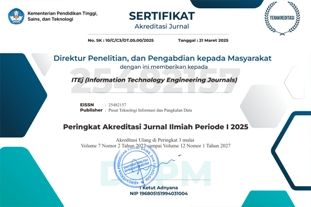Development of an Operating System Supporting Intelligent Predictions and Recommendations
Abstract
This Study discusses the development of an intelligent operating system feature that supports smart prediction and recommendations using artificial intelligence (AI) capabilities within the Linux operating system. The study aims to integrate AI-driven features into Linux to enhance user productivity and efficiency by providing relevant application recommendations based on user behavior patterns. The implementation involves data collection of application usage, training machine learning models for application recommendations, and integrating these features into the Linux environment. The project utilizes Python for scripting, employing libraries such as psutil, pandas, scikit-learn, and joblib for data handling and machine learning tasks. The results demonstrate successful implementation of the AI-driven recommendation system, enhancing user interaction and productivity within the Linux operating system
Downloads
References
J. V. Souto dan M. Castro, “Improving concurrency and memory usage in distributed operating systems for lightweight manycores via cooperative time-sharing lightweight tasks,” J. Parallel Distrib. Comput., vol. 174, hal. 2–18, Apr 2023, doi: https://doi.org/10.1016/j.jpdc.2022.12.006.
A. Shoshi, R. Miehe, dan T. Bauernhansl, “Conceptual Thoughts on Biointelligent Embedded Systems and Operating Systems Architecture,” Procedia Comput. Sci., vol. 217, hal. 969–978, 2023, doi: https://doi.org/10.1016/j.procs.2022.12.294.
E. Freitas, A. T. de Oliveira Filho, P. R. X. do Carmo, D. Sadok, dan J. Kelner, “A survey on accelerating technologies for fast network packet processing in Linux environments,” Comput. Commun., vol. 196, hal. 148–166, Des 2022, doi: https://doi.org/10.1016/j.comcom.2022.10.003.
A. Zare et al., “An update for various applications of Artificial Intelligence (AI) for detection and identification of marine environmental pollutions: A bibliometric analysis and systematic review,” Mar. Pollut. Bull., vol. 206, hal. 116751, Sep 2024, doi: https://doi.org/10.1016/j.marpolbul.2024.116751.
A. Orlando et al., “Linux page fault analysis in android systems,” Microprocess. Microsyst., vol. 66, hal. 10–18, Apr 2019, doi: https://doi.org/10.1016/j.micpro.2019.01.006.
D. Chen, Y. Qiao, Y. Sun, dan X. Gao, “Human reliability assessment and risk prediction for deep submergence operating system of manned submersible under the influence of cognitive performance,” Ocean Eng., vol. 266, hal. 112753, Des 2022, doi: https://doi.org/10.1016/j.oceaneng.2022.112753.
E. Marková, P. Sokol, S. P. Krišáková, dan K. Kováčová, “Dataset of Windows operating system forensics artefacts,” Data Br., vol. 55, hal. 110693, Agu 2024, doi: https://doi.org/10.1016/j.dib.2024.110693.
M. Asim, M. F. Amjad, W. Iqbal, H. Afzal, H. Abbas, dan Y. Zhang, “AndroKit: A toolkit for forensics analysis of web browsers on android platform,” Futur. Gener. Comput. Syst., vol. 94, hal. 781–794, Mei 2019, doi: https://doi.org/10.1016/j.future.2018.08.020.
S. Isaac, M. R. Phillips, K. A. Chen, R. Carlson, C. C. Greenberg, dan S. Khairat, “Usability, Acceptability, and Implementation of Artificial Intelligence (AI) and Machine Learning (ML) Techniques in Surgical Coaching and Training: A Scoping Review,” J. Surg. Educ., Mei 2024, doi: https://doi.org/10.1016/j.jsurg.2024.03.018.
K. Wang, X. Yan, Z. Zhu, dan X. (Michael) Chen, “Understanding bike-sharing usage patterns of members and casual users: A case study in New York City,” Travel Behav. Soc., vol. 36, hal. 100793, Jul 2024, doi: https://doi.org/10.1016/j.tbs.2024.100793.
D. Rodoplu Solovchuk, “Advances in AI-assisted biochip technology for biomedicine,” Biomed. Pharmacother., vol. 177, hal. 116997, Agu 2024, doi: https://doi.org/10.1016/j.biopha.2024.116997.
S. Hadzovic, L. Becirspahic, dan S. Mrdovic, “It’s time for artificial intelligence governance,” Internet of Things, vol. 27, hal. 101292, Okt 2024, doi: https://doi.org/10.1016/j.iot.2024.101292.
D. Voke, A. Perry, S. H. Bardach, N. S. Kapadia, dan A. E. Barnato, “Innovation pathways to preserve: Rapid healthcare innovation and dissemination during the COVID-19 pandemic,” Healthcare, vol. 10, no. 4, hal. 100660, Des 2022, doi: https://doi.org/10.1016/j.hjdsi.2022.100660.
S.-Z. Chiou-Wei dan Y.-T. Lee, “Application of KL distance-based intelligent recommendation method to fund recommendation for users with investment behavior in Asia Region,” Heliyon, vol. 10, no. 12, hal. e32959, Jun 2024, doi: https://doi.org/10.1016/j.heliyon.2024.e32959.
G. Duan, Y. Fu, M. Cai, H. Chen, dan J. Sun, “DongTing: A large-scale dataset for anomaly detection of the Linux kernel,” J. Syst. Softw., vol. 203, hal. 111745, Sep 2023, doi: https://doi.org/10.1016/j.jss.2023.111745.
T.-H. Lee, S. Kim, J. Lee, dan C.-H. Jun, “Word2Vec-based efficient privacy-preserving shared representation learning for federated recommendation system in a cross-device setting,” Inf. Sci. (Ny)., vol. 651, hal. 119728, Des 2023, doi: https://doi.org/10.1016/j.ins.2023.119728.
H. Wang, Z. Chen, G. Xiao, dan Z. Zheng, “Network of networks in Linux operating system,” Phys. A Stat. Mech. its Appl., vol. 447, hal. 520–526, Apr 2016, doi: https://doi.org/10.1016/j.physa.2015.12.084.
Y. Guo et al., “A framework for threat intelligence extraction and fusion,” Comput. Secur., vol. 132, hal. 103371, Sep 2023, doi: https://doi.org/10.1016/j.cose.2023.103371.









